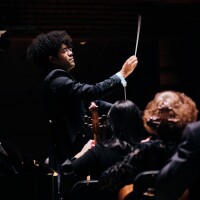Join us on Sunday, Sept. 21 at 1 p.m. on WRTI 90.1, and Monday, Sept. 22 at 7 p.m. on WRTI HD-2 when The Philadelphia Orchestra in Concert series brings you a performance from the Orchestra’s 2024/2025 season, recorded live in January.
Rafael Payare, music director of the Montreal and San Diego symphonies, is on the podium for Pyotr Ilyich Tchaikovsky’s “Pathétique” Symphony, the Suite No. 2 from Maurice Ravel’s ballet Daphnis and Chloe, and a violin concerto by the celebrated Finnish composer Kaija Saariaho. German violinist Carolin Widmann, renowned for her interpretations of contemporary works, makes her debut with the orchestra in the Saariaho work.
Ravel’s ballet Daphnis and Chloe is a love story about a goatherd and a shepherdess, set in ancient Greece. He scored the work for a very large orchestra, and this made it hard for ballet companies to take up the work after the 1912 premiere. But when conductors noticed the exhilarating colors of Ravel’s music, he accommodated them with two concert suites extracted from the full ballet. The second suite consists of the final scene, beginning at dawn. The young lovers celebrate with a growing number of companions, including an homage to Pan, the Greek god of nature, represented by a lengthy flute solo. The dancing gathers momentum and culminates with a thrilling Bacchanal.
Kaija Saariaho wrote her violin concerto in 1994, inspired by the legendary British King Arthur and his Knights of the Round Table, who pursued the Holy Grail. The Finnish composer described writing this work for her own instrument as a kind of search for her own musical Holy Grail: “to realize something that I had long found impossible: to bring an idea of the violin concerto, a genre with so many moving and skillful masterpieces, into my own musical framework and language.” Saariaho’s solution was to envision the soloist as a theatrical actor, engaging with mysterious and luminous sound worlds in the orchestra. She titled the work Graal théâtre (“Grail Theater”).

Tchaikovsky’s final symphony is a fascinating work not only because of the music itself, but also because of the circumstances surrounding its composition. The composer conducted its premiere just nine days before his own untimely death. Within those nine days, he remarked casually to his brother that he felt he had a long time to live. And yet there is a suggestion in the powerful emotional impact of this score that Tchaikovsky might have been thinking of his own mortality as he wrote. He asserted that it contained a hidden program, or meaning, but declined to reveal it, stating that its program, though specific, would remain an enigma to all but himself. “Let them try and guess it!” he wrote to his nephew. And conductors, musicologists, and listeners have been guessing ever since, coming to varying conclusions.
What is absolutely certain is that Tchaikovsky was happy with what he had written. “I can tell you in all sincerity that I consider this symphony the best thing I have done,” he wrote at the time, continuing, “I love it as I have never loved any of my compositions.” And audiences have loved it, too — because of its glorious melodies, its powerful dramatic content, and perhaps above all, the way it speaks of a certain vulnerability which Tchaikovsky clearly felt, and which is universal to human experience.
PROGRAM:
Ravel: Suite No. 2 from Daphnis and Chloe
Saariaho: Graal théâtre for violin and orchestra
Tchaikovsky: Symphony No. 6 in B minor, Op. 74 (“Pathétique”)
The Philadelphia Orchestra
Rafael Payare, conductor
Carolin Widmann, violin
WRTI PRODUCTION TEAM:
Melinda Whiting: Host
Alex Ariff: Senior Producer and Broadcast Engineer
Listen to The Philadelphia Orchestra in Concert broadcasts, every Sunday at 1 PM on WRTI 90.1, streaming at WRTI.org, on the WRTI mobile app, and on your favorite smart speaker. Listen again on Mondays at 7 PM on WRTI HD-2. Listen for up to two weeks after broadcast on WRTI Replay.


